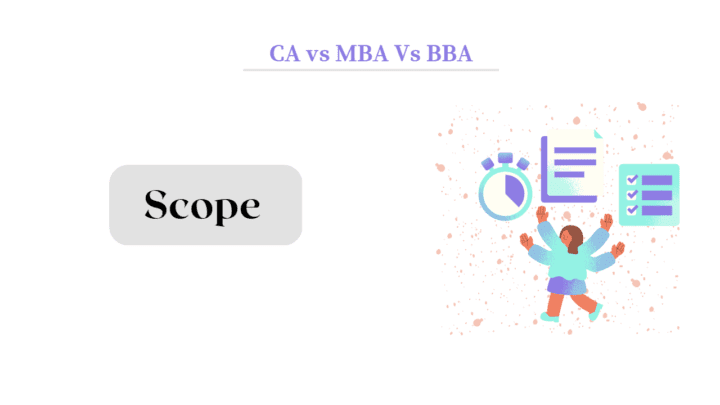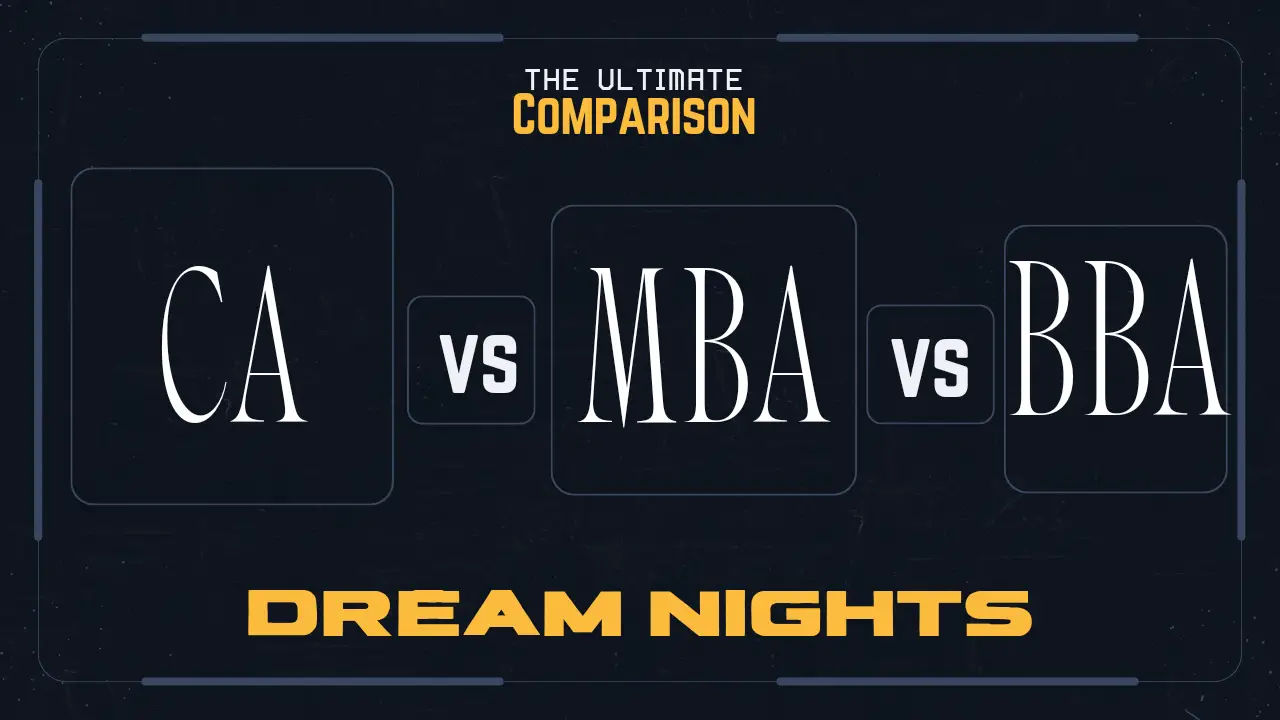Among CA and MBA, and BBA, which is superior? It might be difficult to decide between becoming a CA (Chartered Accountant) and an MBA (Master of Business Administration) or BBA (Batchelor of Business administration), especially if someone is unsure of what you want to do for a living. To help you make a better-educated choice, we’ll compare the three degrees in this article.
Many people today are searching for careers as CAs or MBAs, and BBAs. Students must decide which degree they will utilize as their primary career. To assist students in choosing the best course for them, this article thoroughly examines the benefits and drawbacks of the CA, MBA, and BBA programs.
CA Vs. MBA Vs. BBA: Which Is Better?
When deciding between a CA and MBA or BBA, there are several things to consider. All three programs provide a distinctive mix of abilities and knowledge, and CA is especially different from MBA and BBA; MBA is the extension of the BBA. In simple words, BBA is a bachelor’s degree in business administration, and MBA is acquiring a master’s in BBA. All three degrees have excellent employment prospects. It may be easier to choose which course is preferable for you if you know some significant distinctions between the three.
Courses

Professional knowledge of auditing, accountancy, financial statement analysis, and taxes for an individual or an organization is called chartered accounting. An accounting professional recognized by a statutory authority as competent to handle matters connected to accounting and taxation of a business entity is granted the designation of “Chartered Accountant,” or CA.
Under the System of Education and Training, a student may pursue a Chartered Accountancy program through either the Foundation Course or the Direct Entry Option. Conversely, An MBA is a graduate-level degree that offers academic and practical business or investment management instruction.
Graduates can better understand general business management duties with an MBA and BBA by providing managerial and entrepreneurial competencies to management aspirants from any discipline, including science, commerce, or the arts; the BBA program deals with training and knowledge in the management and administration of the company.
Scope

While MBA applicants can concentrate on one of the degree’s basic subjects, including management or finance, many MBA schools also let students build industry-specific specializations. MBA degrees permit concentrations in information technology, hospitality, education, or criminal justice, even within management specializations.
Several MBA programs collaborate with different professional healthcare programs, such as nursing colleges, to offer combined degrees. While we talk about CA, Despite the recent emergence of several professional and diploma programs, the value of CA courses cannot be understated. All sectors need a qualified CA.
A CA may work for the government, a public entity, or businesses in the private sector. CA offers the option of practicing independently for those who do not prefer to work under a supervisor.
Whether you feel comfortable working in a small or mid-sized private practice, auditing and consulting businesses, the financial industry, or the corporate sector is entirely up to you. You could have the opportunity to work with the Big 4 or for any global company (MNC).
Business management and sales positions are open to BBA graduates. A production manager, a planner, and an administrator are additional positions that some businesses provide. The industries that BBA graduates are looking for employment in our industry architecture, commerce, and financing. They can also submit applications to other government entities.
Skills
Corporate finance includes various activities such as budgeting, money raising, project financing, treasury, etc. Chartered accountants almost always land these jobs in India since it is a tough and intriguing profession. A CA can greatly impact business finance by outsourcing the compilation of financial statements and other accounting-related tasks. On the other hand, you get a diverse set of skills after doing an MBA. It depends on which major you are doing an MBA.
Graduates of MBA programs in finance typically work as investment managers for banks, insurance firms, and other financial institutions. An MBA in HR has strong communication and people management abilities, which are helpful while managing employees in a company. When it comes to controlling people, human resource professionals are increasingly essential.
In sales and marketing, MBA graduates play an important role. The MBA graduate’s main duty as a marketing executive is to plan, create, implement, and execute (take action) the strategic marketing strategies for an entire company to draw in new clients and keep existing ones.
A BBA also provides many skills. The advantage of studying for a BBA is that it gives students an academic, practical, and conceptual understanding of the business world. BBA assists applicants in developing excellent management and leadership skills. It aids in the development of problem-solving and time management abilities as well as strategic and tactical thinking, all of which are essential in today’s cutthroat corporate environment. Additionally, you may pick up a variety of skills that will help you become a well-rounded professional and position yourself for success.
Salary
The annual pay for various MBA programs in India varies from INR 8,00,000 to INR 24,00,000. According to PayScale, the average MBA salary in India in 2022 was ₹8,00,000. One of the best-paying postgraduate programs is the MBA.
Graduates working in BBA positions often earn between INR 2 and 10 LPA. The sort of industry one decides to work in and the job title is other variables that impact pay.
The typical salary in India is between seven and six million rupees per year. Depending on education and work experience, a CA’s income might be anywhere from INR forty to sixty lakhs.
The Difference between an MBA and CA and BBA
An MBA and a CA are distinct in a few important ways (Chartered Accountant). First of all, a CA is a professional qualification, whereas an MBA is a Master’s degree and BBA is a Bachelor’s degree. Second, a CA concentrates on accounting and finance, whereas an MBA focuses on broad business management BBA also does the same but is on the lower side as BBA is an undergraduate program and MBA is a master’s program. Thirdly, an MBA has a broader range of expertise than a CA and a BBA has the least expertise among the three. The third point is that earnings for MBAs are often greater than those for CAs and BBAs.
(Chartered Accountant) as well as those necessary for an MBA course (Master of Business Administration) and BBA (bachelor of business administration). The following are some significant variations:
CA (Chartered Accountant)
- Before you may become a CA, you must finish 4 years of education, including practices known as article ship.
- The subject matter of the curriculum is very specialized and focuses on accounting and finance.
- You will gain knowledge about taxation, audits, financial analysis, and other business-related issues.
- The Institute of Chartered Accountants of India’s professional test must be passed to become a CA (ICAI).
MBA (Master of Business Administration)
- Typically, it takes two years to finish an MBA. You might need to have job experience before applying to some programs.
- More broad subjects like marketing, human resources, operations management, and strategy are included in the program.
- Additionally, you will have the option to focus on a certain field, like marketing or finance.
- A CAT (common admission test) is a must to take admission in IIMs however, a professional test is not necessary to obtain an MBA, while certain schools may have admission examinations.
BBA (Batchelor of Business Administration)
- The course is open to students from the three academic disciplines of science, commerce, and the arts.
- A full-time BBA program lasts three years and is broken up into six semesters. There are, however, several five-year dual degree BBA programs, including BBA LLB and Integrated MBA.
- Merit-based admissions to BBA programs are given in addition to consideration of test results.
- BBA programs can be undertaken full-time, part-time, by correspondence, or online. The most well-liked option is a full-time BBA.
- After finishing Class 12, students can enroll in the BBA program.
Pros And Cons of Each Degree

What you intend to achieve from your degree will determine whether you should pursue an MBA or a CA or BBA. An MBA is the best option for you if you want to develop solid financial and business abilities. However, a CA degree is preferable if you wish to concentrate only on accounting and finance and BBA is a small brother of the MBA degree, it is already covered many times before in this article. Every degree has benefits and disadvantages of its own, therefore it’s critical to consider all the options before choosing one. Here are some advantages and disadvantages of each degree to aid with your decision:
CA | Pros
Pros
- The first benefit is that, unlike programs like medicine, chartered accounting does not require any special qualifying or educational prerequisites. The primary need for this course is a 10th pass or, at most, a 12th pass with any group, which many people may not be aware of. Age is not a factor.
- The first benefit is that, unlike programs like medicine, chartered accounting does not require any special qualifying or educational prerequisites. The primary need for this course is a 10th pass or, at most, a 12th pass with any group, which many people may not be aware of. Age is not a factor.
- This is a better course than any other if someone is serious about auditing financial accounts, that’s for sure.
- A CA aspirant gains a tremendous amount of information while working toward your CA, knowledge that is unmatched by academic courses.
- Aside from enhancing your academic understanding, a CA may also, in my experience, help students to become more patient, persistent, and dedicated.
Cons
- Since it is true that “practice makes a man perfect,” doing CA requires a great deal of patience and subject knowledge.
- People believe that CA is from a specific era, yet this is a misconception. It depends on each individual’s ability to pass the CA levels. Although it may sound like a game, you must learn how to play the hardest game there is.
- When you decide to pursue CA, you just need to put all other distractions aside and go in wholeheartedly. You also need to accept the possibility that your first try might end in failure, which is discouraging but an unpleasant truth.
- You could have disappointments in your professional life, and you might also feel unhappy as you watch your friends graduate, secure jobs, and deal with incessant questioning from family. In essence, practicing CA is like preparing your body and mind for anything
MBA
Pros
- Career advancement is one of the main advantages of earning an MBA. Some businesses demand accreditation for their management-level staff. People without an MBA degree can encounter a “glass ceiling” that makes it difficult for them to advance into higher-level roles.
- The connections you make while enrolled in an MBA school are among its most underappreciated benefits. During your MBA program, you will encounter a lot of ambitious, career-focused people. The connections made in an MBA program are very hard to reproduce outside of the teamwork and intensive setting.
- Although money and a better career may be the external rewards of an MBA degree, the internal advantages are equally significant. A great opportunity to develop one’s personality is an MBA program. You will be forced to step outside of your normal routine in an MBA program. This might help you gain more self-assurance and leadership skills. Students must maintain discipline and acquire good time management skills to complete an MBA degree.
Cons
- An MBA program may need a sizable financial investment. An MBA program’s tuition expenses can range from ₹4 lakh to 15 lakhs. If you are a full-time student, you must also take into account other expenses like accommodation and textbooks.
- Depending on the school and the country you are learning in, an MBA can be completed in a minimum of one year and a maximum of two years at full-time. It may take much longer to get your MBA if you are studying part-time. This requires a considerable time investment.
BBA
Pros
- Accountancy, finance, sales, and management are just a few of the topics covered in BBA degrees, which provide students with a thorough grasp of the business world.
- Internships, case analyses, and team projects, which enable students to apply their knowledge to actual business problems and obtain useful practical experience, are frequent features of BBA programs.
- BBA graduates are well-equipped for a variety of business occupations, including managerial roles in organizations of all sizes and across all sectors.
- Given that it is a degree that is highly accepted and acknowledged in the business world, a BBA degree can result in increased earning potential and greater employment opportunities.
- Students in BBA programs get the chance to interact with academics and other business experts, which is beneficial in the current employment environment.
- Entrepreneurship, negotiation, and corporate responsibility are topics that are frequently included in BBA programs and help students build the abilities necessary to be successful in management positions.
- Numerous colleges offer BBA degrees, and students have a wide range of alternatives to select from, including full-time or part-time, online or on-campus, and standard or accelerated programs.
Cons
- A BBA degree can lead to a variety of management and business-related careers, but it might not be as adaptable as other bachelor’s degrees, such as liberal arts degrees.
- A BBA degree is a solid starting point for pursuing a business graduate degree, such as an MBA, but it might not be as helpful for other graduate programs.
- Business is a major focus in BBA degrees, therefore there may not be many opportunities for students to pursue their other interests or learn about other fields.
- As an undergraduate degree, the BBA may not expose students to the cutting-edge business principles and theories that graduate programs address.
Conclusion
There are multiple reasons to pick one degree over another, but it all comes down to your passions and aspirations. Look into getting an MBA if you want to work in a business environment.
The degree range is far greater than that of a CA program, and the courses will equip you for the cutthroat corporate world BBA is just an undergraduate program if you just passed 12th and don’t want any conventional graduate degree like BA or b.com then go for it.
Depending on the information and abilities you desire to acquire, it varies. Although a CA can potentially be quite profitable, an MBA will probably pay out financially in the long term and BBA can give you a sustainable job based on your graduation.

